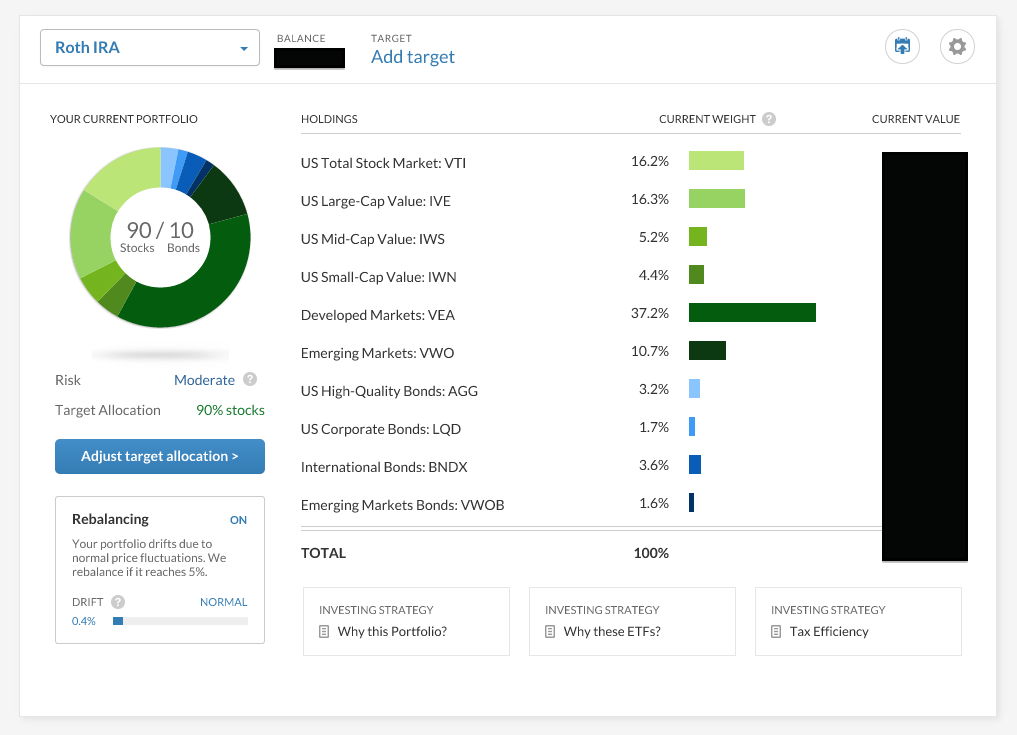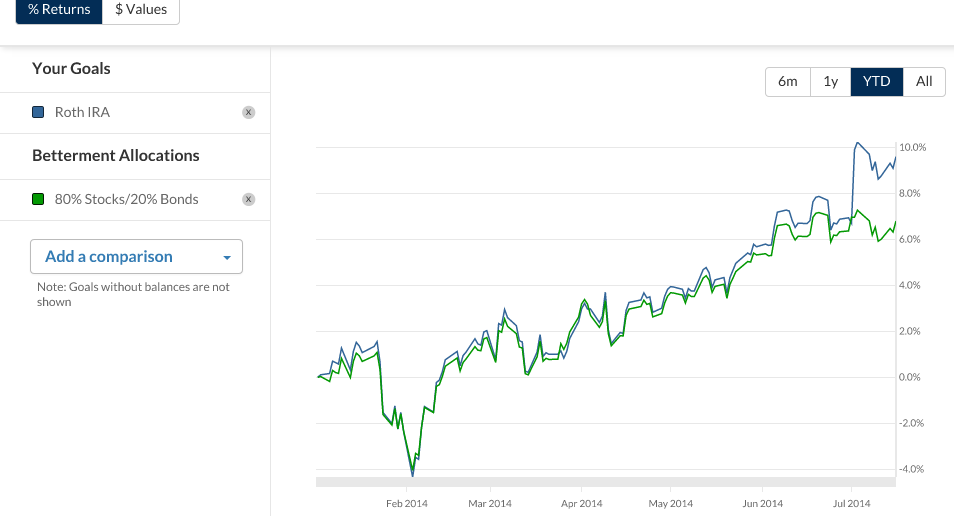If you want a hands-off approach to your investment portfolio, and you're looking for ways to save for multiple goals using investing, Betterment is for you. Here's my Betterment review.
Many people worry about investing and choosing an online broker that will work for them. There are many brokerage options out there, and that means that you have to carefully consider the best option for you. If you are looking for straight-up simplicity for the long-term, it's hard to beat Betterment.
Many people use Betterment to manage their own investment goals, and it can work well for you.
Betterment Review: Pros and Cons
Pros
- Easy to invest: Makes it simple to get started investing with a small amount of money. You don't have to make a lot of decisions or worry about stock picking.
- Tax optimization: Take advantage of tax-loss harvesting, and that Betterment will help you put different types of assets in accounts where they'll do the most good.
- Manage different goals: Set up different goals, with different asset allocations. This is a great help if you're interested in using a bucket strategy to manage your investments.
- Portfolio tools: Use the projection tools to run different scenarios and see if you can tweak your contributions and asset allocation to better reach your goals.
Cons
- No active trading or stock picking: For those who want a little more control over their portfolios, Betterment might not be the best choice.
- Lack of a 529 account: While there's a college planning package, you can't actually invest in a 529 with Betterment.
- No custodial accounts: There still aren't custodial accounts, so if you want accounts for your kids, you have to go elsewhere.
Detailed Betterment Review: Manage Your Financial Goals
One of the earliest robo-advisors, Betterment is kind of the OG of the space. Rather than forcing you to figure out how to invest your money, you can set up your account and Betterment will use your risk tolerance and modern portfolio theory to put together an account that works for you.
It's possible to sign up for a variety of goals with accounts including:
- Roth IRA
- Rollover IRA — maybe from a work 401(k)
- Travel fund
- Savings
- Checking
Each goal comes with its own risk level. For example, a retirement account might have a 90/10 stock/bond split, but a travel fund could be a little more conservative, with a 58/42 stock/bond split.
The idea is that you can put money to work on your behalf, and reap the benefits, based on what kind of tax treatment you want for the money, as well as when you think you might access it.
Signing up for Betterment
The signup process for Betterment is very easy. It takes just a couple of minutes. You can sign up quite quickly and begin the process of setting up my asset allocation. The following accounts are available with Betterment:
- Individual taxable
- Joint taxable
- IRA (Traditional, Roth, SEP, Rollover)
- Trust
- Savings
- Checking
Betterment also allows you to set up goal-based accounts. You can set up an account designed to help you build your emergency fund, save up for a house, or do any number of other things. Really, it's up to you.
Interesting features offered by Betterment
Since its inception, Betterment has been adding new features, and one of the best features is how it manages tax reporting. For those with non-Roth accounts, Betterment's tax tools can also help you better harvest losses. Betterment will help you figure out when to sell, as well as help you match up capital gains and losses more effectively.
On top of that, Betterment also offers financial planning packages starting at $199. Some of the ways you can benefit include:
- Getting started
- Financial checkup
- College planning
- Marriage planning
- Retirement planning
It's also interesting that Betterment is also getting into the banking services game. You can get an account, called a Cash Reserve, with a competitive yield. Plus, Betterment also offers a checking account, complete with a debit card.
Finally, it's possible to sync up outside accounts to pull in information about what's going on in other places. This feature can be useful since Betterment offers a two-way sweep feature that will analyze an outside account and automatically move money into savings — and out — automatically.
How does Betterment build your portfolio?
As you sign up for Betterment, you'll answer basic questions about your name and address, and share your Social Security number, as well as share information about your basic goals.
When you open a retirement account, the main question asked is when you hope to retire. Betterment picks an asset allocation for you, using ETFs to accomplish your goals. If you want to tweak your goals or asset allocation, you can do so fairly easily.

Betterment automatically keeps you on track by adjusting your portfolio every three months — or when your asset allocation strays by more than 5%.
Asset allocation is considered one of the most important aspects of long-term investment planning, and that is what Betterment focuses on for you. Betterment makes it easy for you to see your portfolio composition and makes it easy to get answers to the “why” questions you might have.
Betterment's transparency with why certain ETFs are chosen, and the reasoning behind other moves, is refreshing and adds an educational dimension to Betterment's offering. In addition to offering basic portfolios, you can also choose socially responsible investing, target income, and smart beta portfolios that offer different options, based on your preferences.
Finally, you do need to go through a verification process with Betterment before your initial deposit is taken from your bank account. You will need to confirm your email, as well as confirm two small deposits made to your bank account to verify the situation.
The confirmation email might come quickly, but be aware that it can take up to two days for the bank deposits to be made. Until then, all you can do is manage your asset allocation and set up details like adding beneficiaries.
Using ETFs to build your Betterment portfolio
I also like the focus on ETFs from Betterment. Investing in individual equities requires more effort and attention. ETFs also allow you to take advantage of large swaths of market performance.
For many investors, using ETFs can mean that it's possible to take a more aggressive position than the generally accepted 80/20 stock/bond allocation.

Betterment also offers real estate exposure through the use of REITs. This makes it appealing on many levels, especially since it adds another asset class to your portfolio.
How much does Betterment cost?
- 0.25% for accounts up to $100,000
- 0.40% for Premium accounts above $100,000
There are no minimum requirements with Betterment, which means you can start anytime you want — and contribute as much as you want.
Examples of Using Betterment to Meet Your Goals
Let's take a look at some examples of how effective Betterment can be when it comes to hands-off investing and using your money as a tool to reach your goals.
Travel fund — taxable savings to allow me to travel more
Betterment can be used for short-term goals, like a travel fund. Each month, transfer a set amount of money is automatically transferred into a Travel goal on Betterment. Make the asset allocation a little more conservative than a long-term goal, just in case.
The good news, though, is that even with a more conservative allocation, the money still grows at a faster pace than it would if you put it in a high-yield savings account. So, the money goes in, it grows, and later, you can use it.
Consider paying for travel using a credit card in combination with other rewards programs. This makes it possible to get credit card points and other rewards. Once the money is on the credit card, sell the required assets in the Travel goal. You probably won't have to liquidate everything in that goal. Instead, just liquidate what you need to pay the credit card bill before the balance begins accruing interest.
Generally, any capital gains you end up with are probably going to be relatively small, so the impact on your taxes shouldn't be too big. And, if you do have to sell at a loss, you can at least deduct it. That's right: if you have to sell at a loss, your vacation is now tax-deductible.
This can work well because you have the capital you need, and what you don't use keeps growing.
By the way, I used this tactic with my own travel fund (held elsewhere) to pay for a Viking River Cruise for my son and me in 2017. I booked it through Delta SkyMiles Cruises and got triple points for it, plus the other credit card rewards and cashback.
Cash Reserve — last-minute money
You could potentially use the Cash Reserve account for last-minute money things. It offers a fairly high yield and you can access the money a little faster than going through the process involved with getting money from the taxable investment account.
Again, put a set amount of money into that account each month. Use your credit card to pay for costs upfront (and get the credit card rewards), but then dip into the Cash Reserve for quick cash on small expenses. Next, use the money in the cash reserve account to pay off the credit card and move on.
A different account, meant for long-term emergencies, is something else altogether. That account is invested somewhat aggressively and can be used for bigger issues. With small issues, the Cash Reserve because it's a smaller account. Once that Cash Reserve gets beyond a certain point (usually about six weeks' worth of expenses), consider moving the excess into the long-term emergency savings so it can earn at a potentially higher rate through investments.
In any case, the idea is that you have the ability to move my money around fairly easily with Betterment and use that money to meet different goals. Betterment is generally accessible for what you're likely to need — as long as you leave adequate time for transfers.
Saving for retirement
A Betterment account is great for saving for retirement. Even if you don't really subscribe to “traditional” retirement, it's good to have tax-efficient, uber-long-term money sitting there, earning interest for the long haul, and able to be accessed later.
Tax-efficient investing is part of a good long-term financial plan, so using Betterment to save for retirement makes sense. The reality, though, is that the travel fund and emergency savings are more likely to be effective when it comes to the day-to-day benefits of using Betterment to invest and meet your financial goals.
Final Word: Who Should Use Betterment?
Betterment is likely best for those who want an easy way to use investing to meet various goals. It's a great robo-advisor for someone hoping to manage their money easily and get a solid overview. Using Betterment can be great for the set-it-and-forget-it sort of indexer.
It's possible to use Betterment to save for retirement, keep liquid cash, and also meet short-term goals like travel and saving for a home down payment.
If you want an easy way to start investing for different goals, and you don't want to tinker a lot, Betterment can be a solid way to move forward and make the most of your money.




Planning for retirement is important. Investment is a good idea to have income in the future.
Retirement savings is one of the most important goals in life. Each person should think about what his life will be like in adulthood.